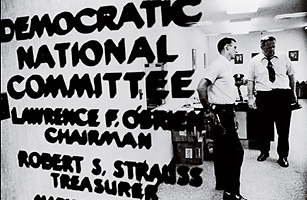
The Democratic National Committee headquarters the day after the break-in.
June 17, 1972
It was actually the burglars' second break-in at the Democratic National Committee's headquarters in the Watergate office-apartment-hotel complex. The first time they bugged the phone, but on this night they were trying to fix the inoperative listening device. Sent by President Nixon's re-election committee, they set off a cascade of stupidity by taping open the lock on an office door, wrapping the tape in such a way as to be visible to building guard Frank Wills. The first time he saw the gray tape, he peeled it off and threw it away. When he noticed that someone had replaced it, he called the cops. The political espionage was utterly unnecessary. Richard Nixon was going to win in a landslide anyway. Rather than fire all those responsible for the break-in, Nixon instead paid the five arrested burglars hush money from an illegal White House slush fund; urged the CIA to close down the FBI investigation; told his subordinates to lie to investigators; discussed a variety of illegal cover-up plans in the Oval Office, knowing a tape recorder was already in operation there; fired the special prosecutor for the case who had been hired by his Justice Department; defied court orders to turn over the tapes; and then, faced with certain impeachment by Congress, announced his resignation on Aug. 8, 1974, the only American President ever to quit the job. The scandal poisoned national politics and undermined public trust in government for decades.